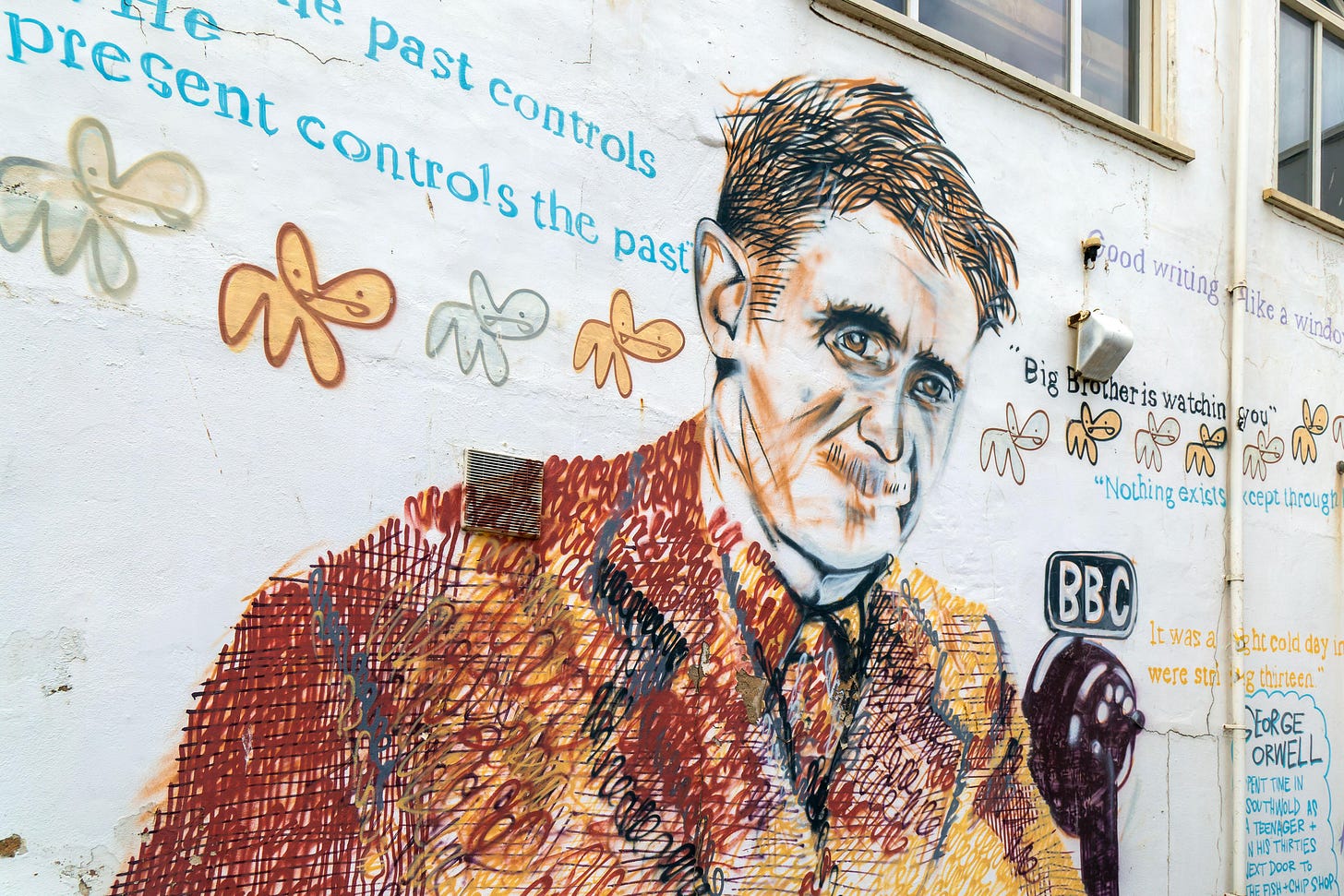“If you want a picture of the future, imagine a boot stamping on a human face—forever”.
It’s become a cliché, wheeled out every time someone mutters about state overreach. As has the term Orwellian, now so overused it’s almost lost meaning. But recent revelations demand we take a fresh look—because Orwell’s soothsaying, his condemnation of a time and place defined by Stalinism is no longer theoretical. It’s happening.
Seditious underground national newspapers report that the government is now quietly pressuring tech companies to remove content that critiques sensitive policy areas -immigration, two-tier policing, rising public anger in white working-class communities. These aren’t isolated complaints about online harm. They’re part of a creeping effort to police opinion, shape perception, and suppress dissent.
It’s the thin end of a wedge that should alarm anyone who still believes in open debate.
In 1984, Orwell wrote: “Who controls the past controls the future: who controls the present controls the past.” And that’s precisely what’s happening. Today’s Ministry of Truth doesn’t need secret police. It has tech firms, algorithms, and regulatory bodies doing the job. A tweet disappears. A video is delisted. A search result vanishes. And so the version of reality that challenges official orthodoxy simply ceases to exist. It is vapourised. Winston has dropped it into the memory hole, never to return.
But this isn’t just digital. It’s institutional. Schools send girls home for wearing a Union Jack dress. They fire teachers who suggest on social media that Lucy Connolly was harshly done by. Councils quietly drop national flags or Christian holidays on the basis of vicarious offence rarely actually felt.
There are academics who teach a view of British history that draws lazy, false parallels between empire and the Third Reich. Ambiguity has become “thought crime” and complexity is no longer permitted. British history is painted not as a struggle or an evolution by turns glorious, desperate, perfidious or heroic but as sin. A founding and original sin.
The result is cultural gaslighting. Our past is not merely questioned—it’s being rewritten, discredited, and eventually, forgotten. Orwell saw it coming: “History has stopped. Nothing exists except an endless present in which the Party is always right.”
That endless present is now. You carry the telescreen in your pocket. You track yourself. You hand over your location, your biometrics, your preferences—all for convenience. And in exchange, you get curated compliance.
But what happens when a generation no longer sees its country as worth defending—culturally, morally, or even conceptually? Polling increasingly shows a disconnection between the young and the idea of the nation itself. Many no longer view Britain as a shared inheritance, but as a mistake to be corrected, or worse, a shame to be disavowed.
This isn’t entirely their fault. If you’re taught from the age of five that your national story is one of theft, cruelty, and shame—if your history is only ever presented as burden rather than bond—then why would you feel loyalty? Why would you feel pride? If all you ever hear is that the country is broken, colonial, racist, toxic—why would you want to belong to it?
“Give me the boy (or child) until he is seven and I will give you the man”, as St Ignatius of the Jesuits said. Now, the state has him until he’s at least 18.
This is not just a failure of education. It is a deliberate act of cultural disinheritance. A young person who cannot name a single British Prime Minister before 1997 but can recite the crimes of the empire by rote is not educated. They are conditioned. And the result is not just alienation. It is apathy. As Orwell knew, if you erase the past and undermine the present, you sap the desire to battle for the future.
Meanwhile, the political Left— theoretically Orwell’s own tribe— has turned against the working class it once claimed to represent. The shelf-stackers, bus drivers, welders and labourers are now dismissed as angry, parochial, problematic. As Orwell might have put it today: “All voices are equal, but some voices are more equal than others.” An entrenched snobbery Orwell recognised in his own lifetime.
“The typical Socialist is not, as tremulous old ladies imagine, a ferocious-looking working man with greasy overalls and a raucous voice. He is either a youthful snob-Bolshevik… or, still more typically, a prim little man with a white-collar job, usually a secret teetotaller and often with vegetarian leanings… with a social position to safeguard and a nice house to live in.”
The real danger though is not in the easy dismissal of working class patriotism, working class social conservatism or, indeed, working class concerns. It’s state-endorsed forgetfulness.
Memory warfare, and, as far as I can remember, we’re losing.
One can find an unlikely echo beyond Orwell in Game of Thrones where the Night King seeks to erase memory itself—“because without memory, there is no future”. Eternal night is what happens the past is unmade and when no record exists outside the approved narrative. A people, unanchored, are doomed to cultural drift. To darkness unilluminated by the comfort of fire and affirming tale.
So the boot on the face is no longer needed. We are being silenced not with force, but with fatigue. Not with bans, but with benevolence. Not with censorship, but with “safety.”
This is the new Room 101: a room in which once I worked at BBC Broadcasting House and which, apocryphally or otherwise, was where Orwell once did too. Forming as he did so, an idea for the Ministry of Truth.
Invisibly, politely, now installed by us and via app. And all, very, Orwellian.











